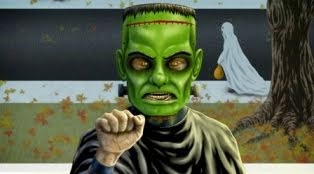Monday, May 7, 2018
DISASTER MOVIES MONTH: Earthquake (1974)
Earthquake movies have been around for a long time. As far as natural calamities go, there are few more dramatic than the Earth around us shaking out of control. Considering the American film industry is centered in a pretty active seismic area, it makes sense that they are a common cinematic topic. Hollywood has been making movies about earthquakes since at least 1913, when “When the Earth Trembled” came out. So it's no surprise that, during the disaster movie fad of the seventies, one of the biggest films of the movement was about just that. Simply entitled “Earthquake,” it was a superstar production, with Oscar nomineee Mark Robson as director and “Godfather” scribe Mario Puzo as co-writer. It was another huge hit, becoming the fifth highest grossing film of the year.
A small tremor shakes through Los Angeles. The city's citizens – including a former football pro, his drunkard wife, his mistress, her son, a motorcycle stunt performer, and a grouchy cop – are startled but think nothing of it. This, however, is just the precursor to a much bigger quake. The people's normal lives are torn apart when a massive 9.9 earthquake brings the city to its knees. Entire buildings are demolished. Huge cracks open in the ground. Fires and explosions break out. Debris rains everywhere. In the aftermath, chaos breaks out. These divergent characters are going to have to learn to work together if they hope to survive.
“Airport” or “The Poseidon Adventure” may have had their funny moments but they were mostly serious affairs. Any camp was unintentional, post-modern results of changing cultural sensibilities. “Earthquake,” however, rather knowingly has its tongue-in-cheek. The film is full of silly stuff. Walter Matthau, credited under a ridiculous pseudonym, appears as a bar room drunk. During the entire quake, he sits still. It's only after the quake is finished that he falls down. In one scene, George Kennedy is shown a busty woman in a tight t-shirt, which lulls him into a dazed, almost hypnotic state. Many of the characters are exaggerated and goofy. This even extends to the disaster scenes. People getting crushed in a falling elevator is horrible. Cartoon blood shooting at the screen afterwards is funny as hell.
Despite being a partially farcical affair, “Earthquake's” scenes of destruction and mayhem are often startling. There's a real sense of panic to the scenes of people fleeing buildings as the structures fall down around them. The images of skyscrapers, smoking and shaken to pieces, is surprisingly strong. When gas leak causes a succession of homes to explode, the rest of the sound mix cuts out, making the audience feel the impact. There's undeniable spectacle to the scenes of destruction but also a fierceness, a sense of shock and horror. The film was presented in theaters with SenSurround, a powerful sound system that would make the moviegoers' chairs shake during the earthquake scenes. While you can't get the same experience at home, some good sub-woofers give you an idea of what audiences felt.
“Earthquake” shares two cast members with the same years's “Airport 1975,” which is surely not a coincidence. Charlton Heston and George Kennedy play very different characters though. Heston's Stewart is introduced having an argument with his wife about his infidelity, coming off like a real asshole. Turns out, Stewart gets something of a redemption arc, the disaster bringing out the best of him. Heston has just enough chemistry with Genevieve Bujold, as the young actress he's courting. Kennedy plays Lou Slade, a cop more concerned with principals than the exact rule of the law. Kennedy grouses and hams it up to great effect. Richard Roundtree is highly amusing as the stunt performer, constantly referencing his one-sided rivalry with Eval Knieval. Ava Gardner (as Heston's wife) and Lorne Green (as her dad) also show up.
With its campy comedy and scenes of massive destruction, the first half of “Earthquake” is pretty damn entertaining. The film's mid-point is devoted to a suspenseful sequence devoted to lowering people out of a crumbling tower. After that, “Earthquake” slows down quite a bit. The Mulholland Dam threatens to crack up, a slow turn of events that isn't as visceral a threat. A lot of attention is paid towards the film's villain. Played by preacher-turned-actor Marjoe Gortner, he's a supermarket bag boy/National Guard member who's obsessed with bodybuilding and military history. Following the quake, he immediately begins to abuse his power. Despite being coded as a deprived homosexual, he nearly assaults Victoria Principals. Gortner goes way over the top and the entire subplot is in questionable taste.
Despite some serious flaws, “Earthquake” is still a highly entertaining movie. Campy laughs and grim violence probably shouldn't mix well but, for some reason, the two flavors taste great together here. The film would spawn two interesting spin-offs. In 1976, the film was shown on TV as a two-part mini-series, an hour of extra footage added to its runtime. “Earthquake” would also inspire one of the most iconic rides at Universal Studios' Orlando theme park. By 1970s standards, it was certainly the ultimate earthquake movie. By modern standards, it's still a fun way to waste two hours. And, hey it has a beautiful John Williams score too. [7/10]
[THE DISASTER MOVIE CHECKLIST: 9 outta 10]
[] Awards Bait Ballad
[X] Corrupt or Incompetent Authority Figures
[X] Destruction of Famous Landmarks
[X] Grim Predictions
[X] Group In-Fighting
[X] Heroic Sacrifices
[X] Massive Collateral Damage or Explosions
[X] Pets or Kids are Imperiled but Survive
[X] Romantic Couple Resolves Problems
[X] Star-Studded Cast
Subscribe to:
Post Comments (Atom)







No comments:
Post a Comment